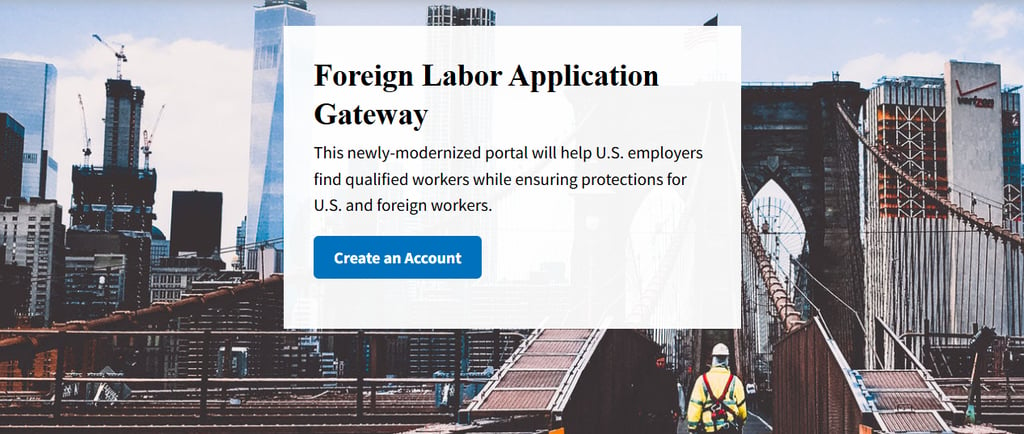Employers Beware: The U.S. is Deleting Foreign Worker Records—Here’s What You Must Do NOW
In a move with serious implications for immigration compliance, the U.S. government is deleting historical foreign worker records. If your organization hires foreign nationals or has filed past immigration petitions, you could lose access to critical data. This article breaks down what’s happening, what’s at risk, and the urgent steps employers need to take to protect themselves and their workforce.
3/19/20254 min read


The U.S. Department of Labor (DOL) recently announced that, starting March 20, 2024, it will delete records of foreign workers from the Foreign Labor Application Gateway (FLAG) system after a specific timeframe. This change raises significant concerns for employers who rely on foreign talent, particularly those sponsoring workers through the H-1B visa program and other employment-based immigration pathways.
This article will break down:
What the H-1B visa is and its role in the U.S. workforce
What a Labor Condition Application (LCA) is and why it matters
What the FLAG system is and its importance
What this record deletion means for employers and foreign workers
The challenges and risks businesses may face
What organizations can do to stay compliant and mitigate risks
What is the H-1B Visa?
The H-1B visa is a non-immigrant visa that allows U.S. employers to hire foreign workers in specialized fields, such as IT, engineering, finance, healthcare, and education. The program is critical for filling skill gaps in industries where qualified U.S. workers are in short supply.
Employer-Sponsored: The employer must file a petition on behalf of the worker.
Specialty Occupation Requirement: The job must require at least a bachelor’s degree or equivalent experience in a specific field.
Labor Condition Application (LCA) Requirement: Employers must submit an LCA through the Foreign Labor Application Gateway (FLAG) system, certifying that hiring a foreign worker will not negatively impact U.S. workers’ wages and conditions.
What is a Labor Condition Application (LCA)?
A Labor Condition Application (LCA) is a mandatory filing with the U.S. Department of Labor (DOL) for employers who want to hire foreign workers on H-1B, H-1B1, or E-3 visas. The LCA ensures that foreign workers are paid fairly and that hiring them will not harm U.S. workers.
Key Components of an LCA:
Wage Requirements: Employers must pay foreign workers the same or higher wages as U.S. workers in similar roles (prevailing wage or actual wage, whichever is higher).
Workplace Conditions: The foreign worker’s employment must not adversely affect U.S. workers’ conditions.
Public Access File (PAF): Employers must maintain a public record of the LCA that includes key details such as wages and job duties.
DOL Certification: The LCA must be approved by the DOL before the employer can file an H-1B petition with U.S. Citizenship and Immigration Services (USCIS).
An LCA is valid for up to three years and can be renewed if the employer wants to continue employing the foreign worker.
What is the Foreign Labor Application Gateway (FLAG)?
The Foreign Labor Application Gateway (FLAG) is an online system managed by the DOL that allows employers to submit and manage applications for hiring foreign workers. It serves as the primary platform for processing:
LCAs for H-1B, H-1B1, and E-3 visas
PERM labor certifications (for employment-based green cards)
Other temporary labor certifications (H-2A, H-2B for agricultural and non-agricultural workers)
FLAG is crucial for employers because it serves as the official record-keeping system for labor certifications. However, with the new policy starting March 20, 2024, past records of foreign workers will be deleted, making it essential for businesses to download and securely store all important documentation before that date.
What is Changing in the FLAG System?
Starting March 20, 2024, the DOL will remove records of foreign workers from FLAG once an application is no longer active. This includes Labor Condition Applications (LCAs) and Permanent Labor Certifications (PERM).
What Does This Mean?
Employers will lose access to past filings for reference, renewals, and compliance audits.
Businesses may struggle to track previous LCAs for existing employees.
Legal teams may face challenges in demonstrating compliance during audits or investigations.
The Impact on Organizations Hiring Foreign Talent
1. Increased Compliance Burden for Employers
Companies must now proactively retain copies of their filings since the FLAG system will not store them indefinitely. This means HR and legal teams need to update internal data retention policies to ensure they have access to critical employment records.
2. Potential Challenges in Renewing H-1B Visas
H-1B visas are typically granted for three years and can be renewed for an additional three years.
When renewing an H-1B or applying for a green card, employers often need to reference past LCAs.
If those records are deleted from FLAG and were not properly stored, it could lead to delays, rejections, or even compliance violations.
3. Increased Risk of Non-Compliance During Audits
The DOL and U.S. Citizenship and Immigration Services (USCIS) regularly audit businesses that sponsor H-1B workers.
Without access to FLAG records, companies must rely on their own internal document retention to respond to audits.
Failure to produce necessary records can lead to fines, penalties, or even debarment from the H-1B program.
4. Small and Mid-Sized Businesses Could Struggle the Most
Larger corporations typically have robust legal and HR teams managing immigration compliance. However, small and mid-sized businesses that lack dedicated immigration resources may struggle to track and retain these critical records, making them more vulnerable to compliance risks.
What Should Employers Do Now?
To avoid compliance issues and ensure smooth sponsorship processes, employers should take immediate action:
1. Download and Secure All Existing FLAG Records
Employers should immediately download all active and past Labor Condition Applications (LCAs) and PERM records from FLAG before March 20, 2024.
Store these records securely in a cloud-based system and ensure they are accessible for future renewals, audits, or legal inquiries.
2. Implement a Robust Record-Keeping System
Retain all LCAs, I-129 petitions, and supporting documents in a centralized and organized system.
Ensure HR, legal, and compliance teams have standard operating procedures for tracking and storing documents.
3. Work Closely with Immigration Attorneys
Employers should consult their legal teams to ensure compliance with evolving immigration policies.
Attorneys can help prepare for audits, guide on best practices for record retention, and navigate renewals without disruptions.
4. Educate HR Teams and Foreign Workers
HR professionals should be trained on the new FLAG policy and its impact on visa sponsorship.
Foreign employees should be informed about how these changes may affect their renewals or green card applications.
5. Consider Alternative Talent Strategies
Given the unpredictability of U.S. immigration policies, companies may want to explore:
Remote work options for roles that can be performed from abroad.
Employment-based green card sponsorships for key talent to reduce reliance on temporary visas.
Expanding domestic hiring initiatives while maintaining H-1B sponsorships strategically.
This change to the FLAG system is a major shift that employers cannot afford to ignore. Companies that depend on foreign talent must act now to retain critical records and avoid compliance risks.
For organizations needing HR compliance support in handling these changes, Cultivate HR Consulting can help you navigate record retention, visa sponsorship, and labor law compliance. Contact us today to ensure your business stays ahead of regulatory changes.
